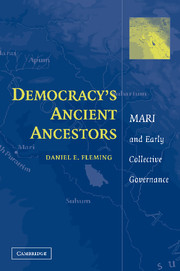Book contents
- Frontmatter
- Contents
- List of Maps and Tables
- Preface
- Acknowledgments
- List of Abbreviations
- Map 1 Ancient Syria and Mesopotamia
- Map 2 The Mari Region
- Map 3 The Ḫabur River Basin
- Democracy's Ancient Ancestors
- 1 Introduction
- 2 The Tribal World of Zimri-Lim
- 3 The Archaic State and the mātum “Land”
- 4 The Collective and the Town
- 5 Conclusions
- Notes
- Glossary of Ancient Terms
- Glossary of Proper Names
- Bibliography
- Subject Index
- Index of Mari Texts
4 - The Collective and the Town
Published online by Cambridge University Press: 14 July 2009
- Frontmatter
- Contents
- List of Maps and Tables
- Preface
- Acknowledgments
- List of Abbreviations
- Map 1 Ancient Syria and Mesopotamia
- Map 2 The Mari Region
- Map 3 The Ḫabur River Basin
- Democracy's Ancient Ancestors
- 1 Introduction
- 2 The Tribal World of Zimri-Lim
- 3 The Archaic State and the mātum “Land”
- 4 The Collective and the Town
- 5 Conclusions
- Notes
- Glossary of Ancient Terms
- Glossary of Proper Names
- Bibliography
- Subject Index
- Index of Mari Texts
Summary
At the most superficial level, the political world of the Mari archives may seem to consist above all of a community of kingdoms, some large and incorporating several major centers, some much smaller and dominated by a single town or fortified center. The texts from Mari allow us to see another expression of political organization in the tribe. Tribal structures overlap the landscape of kingdoms, capable of cutting across the bounds of what a single ruler could control, often contributing the kings themselves, who like Zimri-Lim might define their kingdoms by what they could control from their own tribal base. At a deeper level, however, both the kingdoms and even the large tribal groupings, such as the Binu Simʾal and the Binu Yamina, were superimposed on the smaller communities of ancient subsistence. During the time of the Mari archives and long before them, these consisted of two main elements that were profoundly interdependent: the pastoralists who lived mainly in portable camps and the farmers of permanent settlements whose livelihood was bound to what they could grow. Each group relied to varying degrees on what the other produced, and the Mari texts show that settlement and steppe were often joined within tribal social structures. Even on the small social scale of families, pastoralists and farmers would often have been closely related.
- Type
- Chapter
- Information
- Democracy's Ancient AncestorsMari and Early Collective Governance, pp. 170 - 228Publisher: Cambridge University PressPrint publication year: 2004



